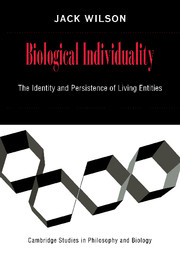Book contents
- Frontmatter
- Contents
- Acknowledgements
- 1 Beyond Horses and Oak Trees
- 2 The Biological and Philosophical Roots of Individuality
- 3 Individuality and Equivocation
- 4 The Necessity of Biological Origin and Substantial Kinds
- 5 Generation and Corruption
- 6 Personal Identity Naturalized
- Appendix: Identity and Sortals
- Notes
- References
- Index
5 - Generation and Corruption
Published online by Cambridge University Press: 05 December 2011
- Frontmatter
- Contents
- Acknowledgements
- 1 Beyond Horses and Oak Trees
- 2 The Biological and Philosophical Roots of Individuality
- 3 Individuality and Equivocation
- 4 The Necessity of Biological Origin and Substantial Kinds
- 5 Generation and Corruption
- 6 Personal Identity Naturalized
- Appendix: Identity and Sortals
- Notes
- References
- Index
Summary
A substantial kind, as defined in Chapter 1, is a kind that an individual cannot cease to fulfill without ceasing to exist. In Chapter 3, I explained which kinds are substantial kinds for living things and the criteria of individuation associated with those kinds. Together, these chapters provide the means to establish the criteria of identity through time for living substantial individuals. A living thing of a particular kind begins to exist when an entity first exists that meets those criteria. That entity ceases to exist when it ceases to meet them. In this chapter I trace several representative life histories for living individuals of the substantial kinds I identified in Chapter 3 and elaborate on the relations between individuals of these kinds through time. In the following sections I explore the origins, growth, and eventual demise of each kind of living individual by considering a number of examples.
Toward the end of this chapter I examine whether death is necessarily the end of an entity. To this point I have treated death as if it were the irrevocable end of a living thing. I have assumed that the change from a living body to a corpse is one that an entity cannot survive. But I am convinced that this is not always the case – a living thing can die and then live again. If Walt Disney actually had been preserved cryogenically after his death and was later revived, he would still be Walt Disney.
- Type
- Chapter
- Information
- Biological IndividualityThe Identity and Persistence of Living Entities, pp. 86 - 104Publisher: Cambridge University PressPrint publication year: 1999



